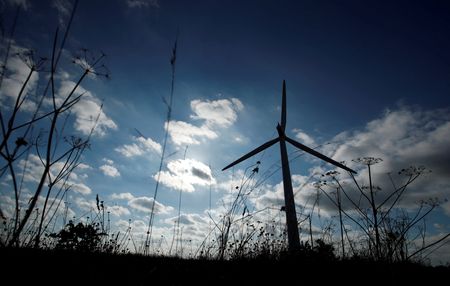LONDON (Reuters) -Britain’s government sought on Monday to defuse a simmering row over a push by some Conservative lawmakers to make it easier to build onshore wind farms by saying Prime Minister Rishi Sunak supported such projects where there is local consent.
Sunak, in power for a month, has come under pressure from lawmakers in his own party over several issues, with some pressing for changes to the government’s levelling up legislation currently in parliament that aims to tackle regional inequalities in Britain.
Simon Clarke, levelling up minister under Sunak’s predecessor Liz Truss, wants to make it easier to build more onshore wind farms where there is local consent, a move supported by Truss and former prime minister Boris Johnson.
Sunak has previously said he would concentrate on offshore wind, but on Monday, business minister Grant Shapps said the prime minister backed building onshore wind farms where there was local consent.
“It’s not really a row. We’re all basically saying the same thing – you need local consent if you’re going to have wind power onshore, because it can be quite a big imposition on the local environment,” Shapps told Times Radio.
“What Simon Clarke has said as the proposer of this amendment, it’s what the prime minister has said.”
When asked if he or the government would now support Clarke’s proposed change, or amendment, to the legislation, Shapps said he had not studied the detail.
A spokesperson for Sunak said the government would “discuss and consult with MPs (members of parliament) to hear their views” but repeated that the prime minister had often said he felt it was right to focus on offshore wind.
Shapps’ words appeared to be aimed at heading off a potential rebellion in parliament against the government after the opposition Labour Party signalled it could back Clarke’s amendment. Several other Conservatives also support it.
Clarke denied he was leading a rebellion, saying he was attempting “to change government policy for the better” and get rid of what he called “a de facto blanket ban on any new onshore sites coming forward”.
“I very much hope that the prime minister will find a way to allow this to happen, because I think it would be genuinely the right thing to do,” he told Times Radio.
Previous Conservative prime ministers have backed a clampdown on new onshore wind farms, one of the cheapest forms of renewable power, but during her short tenure Truss said she would scrap planning restrictions.
A survey by YouGov earlier this year found more than 70% of respondents supported construction of a wind farm in their local area, compared with 17% who opposed.
Sunak’s government has already been forced to delay a parliamentary vote on its housebuilding plans to thwart another rebellion by some lawmakers emboldened by ousting three prime ministers over the last three and a half years.
With an election due in two years, some Conservatives are urging Sunak to take a bolder approach to try to win back voters increasingly disillusioned with politics and to turn around opinion polls which suggest Labour would easily win.
(Reporting by Elizabeth Piper and Kylie MacLellan; Editing by Frank Jack Daniel, Kirsten Donovan)










